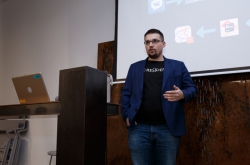The “Innovation Economy and Technological Entrepreneurship” training program was announced during the Moscow International Education Fair in spring of 2017. The main purpose of the program is to instill entrepreneurial qualities in students of technical and natural-science programs at Russian universities.
The training program is conducted by top staff of RVC, professors from ITMO University and Moscow State University, as well as various successful technological entrepreneurs. In five days, representatives of universities from all over the country will learn the basics of teaching the new course “Innovation Economy and Technological Entrepreneurship” and learn the best practices from Russia’s top universities and tech companies; they will also prepare their own final projects. In future, this knowledge should serve as basis for courses that will be offered to students at each of the universities.
Georgy Gogolev, Director of Communications Department at RVC, and Denis Matvienko, Head of Innovative Community Development Initiative at RVC, took the stage at the program launch on June 13. The experts have talked to ITMO.NEWS about the program, the project’s key tasks and about what measures have to be taken to form an effective system of entrepreneurial education in universities.
In the course of your talk you noted that you have been working with universities for four years. It was in that time that universities in Russia began launching projects to develop entrepreneurial competencies and business incubators. What has changed in these four years? What is the current situation?
Georgy Gogolev, Director of Communications Department at RVC: Four years ago, when we first began working with universities, it was quite grim. You could count on your fingers the number of universities in Russia that were at least trying to implement some program or course intended to train entrepreneurs. Four years ago there were practically no universities that would have a working industry cooperation initiative. But it’s very important for educational and research programs to have ties to reality, for professors and scientists to know the state of affairs in the industry, for students to acquire entrepreneurial competencies.

It’s all different now: universities have begun to attract deals from the industry and some of them already have teams working on business incubation and acceleration; there are entrepreneurship centers that teach the relevant subjects; there are developments in fields of coaching and mentorship. Still, there are flaws: for instance, the effectiveness of technology transfer centers leaves much to be desired.
The main obstacle is the lack of teams skilled in this field. According to experiences of successful foreign technology transfer centers, they need to consist of people who have spent years working in the industry, people who are well familiar with the market and have connections. In Russia, the issue of forming teams with serious skills in commercialization of university research is still a relevant one.
Who is teaching entrepreneurship in today’s Russian universities? Are these people competent enough? Generally speaking, which skills and knowledge do they need to possess?
Denis Matvienko, Head of Innovative Community Development Initiative at RVC: In foreign universities, entrepreneurship is usually seen as a subject – this is seen in how universities tend to have a position of professor of entrepreneurship or entrepreneur in residence. Such experts have both entrepreneurial and teaching experience. This is quite important, as not all great businesspeople can be great teachers.
Most often these are entrepreneurs who have retired or taken a break from business. They come to a university, begin teaching, and take part in academic work. There are quite a few cases of successful businesspeople, in their middle or even elder years, enrolling in postgraduate courses in entrepreneurship (this is one of the most popular fields of research abroad; scientific schools of entrepreneurship have been formed). Many of them are dollar millionaires who go into teaching because they enjoy sharing their knowledge with students.
On a few occasions, universities have employed a separate entrepreneur in residence to each of their colleges/departments according to their specializations: a medical entrepreneur to teach medical students, a technological one to teach engineers. Their main task is to make sure that entrepreneurial education is part of the teaching process at their respective department, that there are ties to industry.

In Russia, entrepreneurship is usually taught by professors of management and economics or alums trying to build their academic career right after graduation, which means that they have neither the necessary entrepreneurial nor working experience.
Such practice is common in foreign universities, but just how applicable is it in Russia?
Georgy Gogolev: I think it’s quite relevant here. There are entrepreneurs in Russia who are not yet ready to retire, but still, they can find time to work at a university, to consult students and staff.
Denis Matvienko: Unlike just a few years ago, today’s entrepreneurs express interest in working with universities. Some of them launch and head educational programs; there are a few cases of them financing those departments; they conduct workshops and are invited to speak at entrepreneurship courses, act as mentors in students’ business incubators and accelerators, invest in startups as business-angels.
What motivates them to do this?
Denis Matvienko: For some it’s about finding and attracting talent into their business, for some it’s about sharing their experience with others. And it’s becoming more and more popular. There is already a considerable number of entrepreneurs who have earned enough, developed their business, fulfilled themselves and now want to share their experience, work with charity. A good example is that of Igor Rybakov and his Rybakov Fund, as well as many others. I think that the critical mass of self-made, competent, qualified businesspeople has been reached and this process of including entrepreneurs in entrepreneurial education will gain traction.

Most of the people in the training program are not entrepreneurs themselves. What will be their tasks?
Georgy Gogolev: Their task is to teach students the basic processes and skills that they would need in the future, to spark their interest, show them their future opportunities. And the main skill is being able to accept risks. The educators’ task is to tell the students: “If you want to change the world, you can do it the bad way by wasting away as an assistant engineer in some design bureau or research institute. Or you can start your own company, take a risk, try doing something great, bring your idea to life and commercialize it”. This is what this course is intended to teach them.
Denis Matvienko: The perfect situation is, of course, when the professors themselves are enterprising, or, better yet, entrepreneurs. But there are many aspects to this course – financial, marketing, management, judicial, etc. It’s hard for one person to be an expert in all of those fields. The bigger the business, the less familiar you are with each of the aspects, which is why one tends to hire experts for each of those purposes.
An educator’s task, on one hand, is to be knowledgeable in all of these aspects, yet, on the other, they need to demonstrate an example of entrepreneurial behavior and way of thinking. For example, they shouldn’t “kill” a student’s idea and tell them that something is impossible; instead, they should help students knowingly accept risks, help them discover opportunities, evaluate those opportunities’ potential and make them a reality.

They also have to be good at conveying information in a structured manner and moderate the educational process: oversee the completion of the course schedule, form balanced project teams, encourage communication in those teams, invite the right guest speakers – entrepreneurs and experts in fields related to the students’ project work. This educational program entails solid project work on the students’ part, based on various technologies and research findings from all sorts of scientific fields; teams would often be formed from students with differing training. Each such project needs a mentor, an industry expert. The educators’ task is to oversee this project work and help students complete the path from a concept to a commercialized product.
A survey of students and postgraduates from Russian universities conducted by RVC back in 2012 contains an interesting statistic: while two thirds of first-year students are interested in starting their own business, by the time they reach their postgraduate stage, only 5% still harbor that idea. This drop in motivation is confirmed by other surveys and research. Which of those groups is the target of the educational course these educators will head at their respective universities?
Denis Matvienko: The course is suitable for all kinds of students. We recommend that it is included in the first, second or third year. The specific placement of the course depends on the educational program it’s integrated in. It’s necessary that the course is included in the curriculum as early as possible, but not before the students have acquired some sort of basic business knowledge.
I would like to note that this course is not just about creating a startup – it’s about other entrepreneurial opportunities available to students and graduates, like corporate and academic business. Yes, they can be entrepreneurs if they have the aptitude, the abilities and the motivation; motivation can be increased, aptitudes and abilities can be cultivated, competencies can be formed. Still, even if they don’t, they’ll still apply those skills in their life, which will help greatly in finding employment. For example: according to the results of a study on effectiveness of entrepreneurial education, conducted by the European Commission in 2012, those who attended entrepreneurship courses in university are 19% more successful at finding employment than those who didn’t.

Just a short time ago a mandate was published on the government’s website, addressing the Ministry of Education and a number of other governmental agencies about the need for creation of a roadmap for development of technological entrepreneurship in universities. This roadmap is scheduled to be completed by September 1 of this year. What do you believe has to be included among those measures; what steps need to be taken for such work to actually be implemented in the country’s universities?
Denis Matvienko: Entrepreneurial education needs to finally stop being in the “underground” of educational activity; universities need to be motivated to encourage and support students’ business activity, as well as their business education. There is not enough motivation right now. Those departments that have already been established at universities oftentimes exist only on paper. They need to start actually working.
I should note that the government’s push for this is nothing new: there have already been various programs dedicated to innovation development and entrepreneurship, some of them involving universities. They were all disorganized, e.g. today we open business incubators, tomorrow we open financial literacy courses, and then we rush to create SIEs. These processes were not properly interconnected. This program could well be the first attempt at systematic approach that will allow us to intertwine these ineffective lone departments, university initiatives, program, educational courses, and infrastructure elements and finally make them into a consistent system that will work and bring results. This could be a complex approach to the development of university ecosystems.
Georgy Gogolev: Indeed, there are quite enough projects and inventions on the market. There are professors, there are active incubators and accelerators, various groups and centers, seminars – that is, in essence, the minimally required critical mass for the creation of such an ecosystem. If the Ministry of Education can implement its initiative that will allow for more practical education and more freedom for universities, we will be able to help them in terms of education. For instance, we could implement more courses like the “Innovation Economy and Technological Entrepreneurship” course that we’re training educators for in cooperation with ITMO University and Moscow State University. I believe that, if this happens, we will be able to quickly change the situation for the better.





